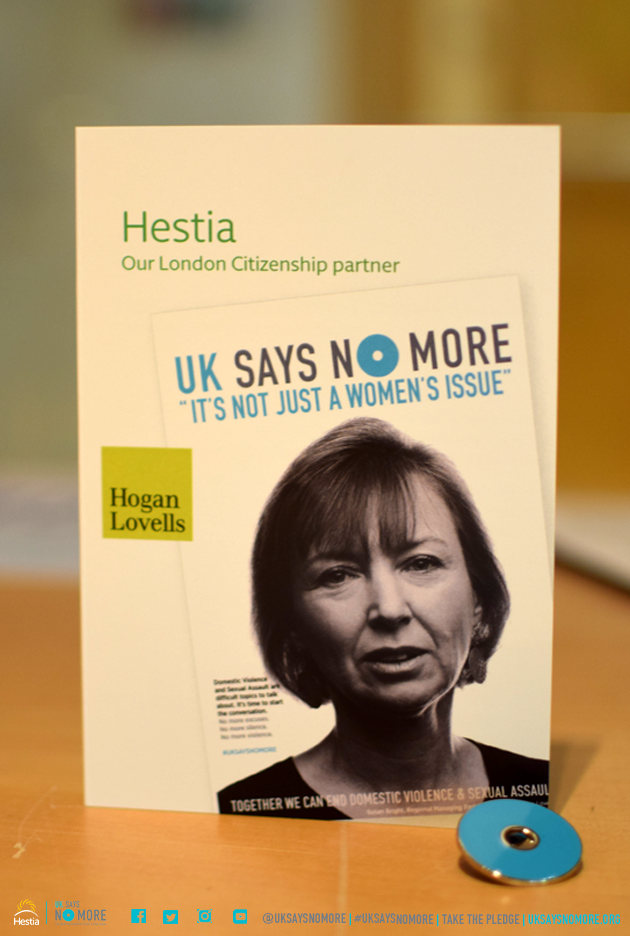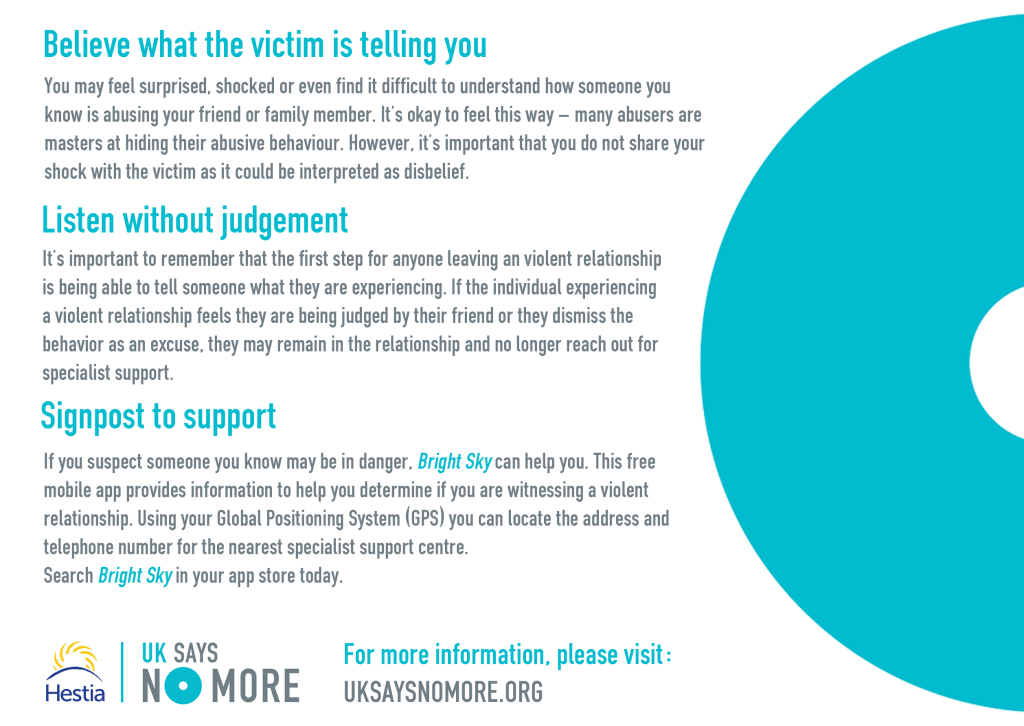By Lyndsey Dearlove, VAWG Partnership Manager at Hestia.
We are so thrilled to announce that global legal practice Hogan Lovells have joined as an official partner of Hestia’s UK SAYS NO MORE campaign. As part of this partnership, Hogan Lovells have been supported to launch their organisational domestic violence policy.
In 2016, Hestia was chosen as Hogan Lovells’ Charity Partner, and have generously provided Hestia with invaluable support. During UK SAYS NO MORE Week 2017, Hogan Lovells are launching a domestic violence policy for their staff, with support from UK SAYS NO MORE and partner The Corporate Alliance.
Find out more from Hogan Lovells about what they do:
Hogan Lovells is a global legal practice that helps corporations, financial institutions, and governments across the spectrum of their business and legal issues globally and locally. We have over 2,500 lawyers operating out of more than 45 offices in Africa, Asia, Europe, Latin America, the Middle East, and the United States.
We combine broad and deep transactional and dispute resolution capabilities enabling us to act on the largest and most complex transactions and cases around the world, with an exceptional regulatory practice, and world leading IP and commercial law capabilities. Hogan Lovells exists to help clients with all their most important matters around the world. We believe that our ability to see business from all perspectives allows us to help clients effectively in today’s – and tomorrow’s – challenging business climate. We provide a partnerled service to ensure the highest quality.
Our commercial and regulatory work gives us the insights and business edge that complements our work on transactions and disputes. We listen to our clients, tailoring our advice based on a deep understanding of their needs. This, combined with our knowledge of markets and industry sectors, provides the foundation for our advice.
As #UKSNM week draws to a close, here’s our Chair Nicholas Cheffings and Gill McGreevy pledging support. @UKSAYSNOMORE @Hestia1970 pic.twitter.com/Jb4fjqP74m
— Hogan Lovells (@HLCitizenship) May 19, 2017
So, why should organisations have a domestic violence policy?
Many of us spend a significant amount of time at work or doing activities connected to work – in addition to the spent thinking and planning work. Your employer has a number of legislated responsibilities towards their employees, but they also have a moral and social responsibility towards us.
Some organisations translate this responsibility into having health and wellbeing policies, private medical care, access to gym membership, loyalty cards and employee assistance programmes. Although having access to these things makes you feel connected, valued and proud of the company we work for there is still more our employers can do.
Employers have an opportunity:
- Last year (2016), 8.5% of women and 4.5% of men have experienced domestic violence, equivalent to an estimated 1.4 million female victims and 700 000 male victims. This equals 1 in 4 women and 1 in 6 men.
- 1/3 of all domestic violence homicides happen on work premises
- In financial terms, domestic abuse costs UK Businesses £1.9 Billion per year in lost productivity and absenteeism. This figure does not address the emotional and psychological toll of coercive control.
- 2% of women will lose their job due to the effects if abuse and violence
Start by getting involved – join the UK SAYS NO MORE campaign as an official partner and say NO MORE to domestic violence and sexual assault.
Introduce a domestic violence policy for in your workplace the policy should discuss the following:
1) Define domestic abuse
Jasmine told me:
‘I had been married to my husband for six weeks when he first hit me, he said it was my fault for staying late at work. Six years months past and I was now pregnant, whilst looking through our HR polices for our family policy, when I found the organisations DV policy – I spent an hour reading it over and over again, I realised what I was experiencing was not okay, I used the telephone number and called an IDVA. No-one at work every knew what I had experienced or how that policy changed my life’
2) Your policy should enable your management team the resources to respond to domestic abuse disclosures. We know the the reason why people do not ask the question about domestic abuse is that people are worried about what they will need to do to respond.
You can use the How to Help postcards (also available for supporting men, and LGBTQ+ people) which can be printed and used to start off a conversation around supporting someone who is experiencing domestic violence and/or sexual assault.
3) Discuss opportunities for both victims of abuse to receive support from specialist support services and for abusers to seek support from specialist perpetrator intervention programs
‘I’d been married for three years; he controlled everything that I did. He picked and dropped me off at work. Monitored my phone calls and would not allow me to use the computer at home. I was desperate to talk to someone but too afraid to tell anyone at work, in case they found me to be a nuisance and fired me. The day that changed my life clearly, Our Company – a large accountancy firm launched their HR DV policy during our annual conference. They spoke about the support that was available within our company and that there is specialist support services for victims of domestic abuse.
This was the first time I had heard that support was available for people like me… a victim of abuse perpetrated by my husband. I contacted the Independent domestic violence advocate service. My managers enabled me to meet them at work during work hours without this opportunity I would not have been able to get the advice and support that I needed. I now live in another city, my children and I spent six months in a refuge and my employer relocated me to a satellite office, in the new city. We are now safe, children are at school and I have just been promoted’.
4) And finally, how you would work with a victim to keep them safe at work:
Thomas:
‘I was terrified as I knocked on the director’s door, I had just been promoted to senior management and now I was knocking on her door to tell him that I needed to resign, after months of working towards this promotion. I had tell them that it wasn’t safe for me to come to work, my ex-girlfriend had sent over fifty messages this weekend, with many of containing threats of how she would ruin me at work and in public. She said that she would tell my boss that I had stolen money, that I was addicted to pornography and that I was a drug user and would continue coming to my workplace if we didn’t get back together – I was left with no choice, I had to resign, not only were her allegations completely untrue but my job required me to have a positive professional profile and these allegations would have ruined me and brought my company into disrepute.
When I told him that I had to resign he asked me why, I said my ex-girlfriend, I struggled to find the rest of the words. So he did, he started telling me that he had attended a lunch time talk about domestic abuse and that he had been surprised at the number of men who experience domestic abuse or stalking for their partners and that the statistics indicate that one in six men will experience abuse. It had made him think of his team and how in some of our office banter about our weekends and how we have laughed when one of us may have mentioned that our partner was checking our phones, controlling our time and making threats to prevent separation. He said that we shouldn’t laugh as this behaviour is not okay. He gave me the phone number for a specialist support service – which was great; they helped me obtain an injunction that prevented her from contacting me or my employer.
My employer were great too, security were notified and they would not grant access, reception were told to not put any calls through to me from her and as I had told my boss about the treats we were able to put a plan in place to not only prevent it but to respond if it did happen. Having my companies support was invaluable to me during this time’.
Introducing a domestic violence policy at work has a secondary benefit and indirectly you are contributing to sociality – You start the conversation…
And that’s how we, at UK SAYS NO MORE see that we can together end domestic abuse and sexual assault. We have to start talking about domestic abuse and sexual violence, in our work places, at home – around the dining room table, in social settings and on social media. By talking about it, naming it, it enables victims to come forward and ask for help, it enables us to offer the support that these victim need.
[maxbutton id=”31″ ] [maxbutton id=”6″ ] [maxbutton id=”1″ ]
Download the UK SAYS NO MORE Toolkit for images, posters and more.
Get the How to Help postcards which can be printed and used to start off a conversation around supporting someone who is experiencing domestic violence and/or sexual assault. Let’s end the silence!




